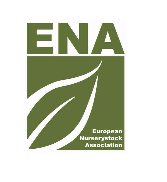 The ENA General Assembly included Turkey as a new member, discussed Xylella and gave the opening shot to the Green Cities promotion campaign.
The ENA General Assembly included Turkey as a new member, discussed Xylella and gave the opening shot to the Green Cities promotion campaign.
ENA celebrated its last General Assembly meeting at IPM (Essen, Germany) on January 25th, 2018. 30 delegates from 17 countries met to discuss the main concerns of the European nursery stock industry.
SÜSBIR – the Turkish Ornamental Plant Growers Union – becomes the 21st member of ENA.
The delegates from Turkey attended their first ENA General Assembly meeting and SÜSBIR, the Turkish Ornamental Plant Growers Union, was accepted as a new member, the 21st member of ENA. Mr. Riccardo Disperati, External Relations Coordinator of SUSBIR, gave to the meeting a presentation of the nursery sector in Turkey.
SÜSBİR, founded in 2008, is a trade association and the only public institution representing ornamental plant growers in Turkey. With some 600 members, SÜSBİR accounts for nearly 50 percent of the total ornamental plant production area in Turkey. There is around 3.500 ha of outdoor ornamental plant production in Turkey and nearly half of this is in the Marmara region. Aegean, Mediterranean and Central Anatolia regions also have significant nursery production. Turkey is an importer of live plants ($73 million in 2016) although is also a great exporter ($45 million in 2016).
In early 2017 SÜSBİR launched a Product Announcement and Sales Portal, accessible from www.susbir.org.tr, where members can upload their products and municipalities can search for the plants they need and the nurseries where they can be found.
“Green Cities for a Sustainable Europe” Promotion Campaign.
The delegates expressed their satisfaction with the progress of the Promotion Working Group, chaired by Mr Leon Smet, after the President of ENA, Mr Tim Edwards, signed a Grant Agreement with CHAFEA (Consumers, Health, Agriculture and Food Executive Agency) of the European Commission to launch a promotion campaign with the slogan “Green Cities for a Sustainable Europe”. The Green Cities campaign has a total budget of €2.1 million, that will be supported by the aid of 80% from the European Union and will run from now until the end of 2020.
Seven of the ENA members are working together on this initiative and providing funding: AVBS-VLAM from Belgium, BAOPN from Bulgaria, Danske Planteskoler from Denmark, BdB from Germany, Val’hor from France, HTA-NFU from the UK and Anthos-LTO-‘De Groene Stad’ from the Netherlands. This team also had a dedicated meeting in Essen to coordinate the final details of the first activities to be executed this year.
The project ‘Green cities for a sustainable Europe’ is a B2B promotion campaign, targeted at decision-making professionals in city and landscape planning and it is not focused on the consumer market. The project will give tools and technical background that will inform decision makers and politicians allow them to communicate this message of green cities for a sustainable Europe to the citizens for whom they work. The main strand of the project will be a series of congresses, seminars and B2B meetings, an extended website and public relations. The main goal of the Green Cities campaign is to increase awareness of the many benefits of using live plants in the cities, towns and villages, for both the citizens and the environment.
On April 10th, the “Green Cities for a Sustainable Europe” Working Group met again to coordinate the promotion campaign in the seven countries and to decide on visual designs to be used.
Xylella fastidiosa
As usual in the recent meetings, it was necessary to discuss the disease Xylella fastidiosa, the recent findings and the updates to legislation. European nurseries are aware of the risks posed by this bacterium and carry great responsibility for plant health in general and in relation to the prevention of the spread of Xylella fastidiosa in particular. The General Assembly agreed on the need to stress some aspects of disease management:
- At all levels, political, commercial and production, the taken decisions should be based on sound scientific evidence.
- Current scientific evidence and legislation does not justify a movement ban of plants from an entire country, or from some regions of a country, simply because that country contains demarcated zones or infected zones for Xylella.
- All EU countries are obligated to continuously monitor the pest-free areas in line with legal requirements and official international standards.
- All industry operators must clearly understand the different regulatory and risk implications relating to host plants, species that have been found infected by Xylella in the EU, and the specified plants, species that have been found infected in the rest of the world.
- All nurseries must rapidly become aware of the obligation to sample and test plants in the production of the following species before trading them: Coffea, Lavandula dentata, Nerium oleander, Olea europaea, Polygala myrtifolia and Prunus dulcis.
- Traceability needs to be ensured: all nurseries, wholesalers and retailers must be aware of the obligation to keep records, for at least 3 years, of each lot of plants of the following species that arrives to or departs from their facilities, including the details of the supplier or the professional customer: Coffea, Lavandula dentata, Nerium oleander, Olea europaea, Polygala myrtifolia and Prunus dulcis.
Next General Assembly in the United Kingdom
The ENA General Assembly agreed on meeting again in early summer, in the United Kingdom. HTA is planning the meeting in Oxford for the 27th June 2018, and post-meeting visits to relevant nurseries, garden centres and the Royal Horticultural Society at Wisley.



